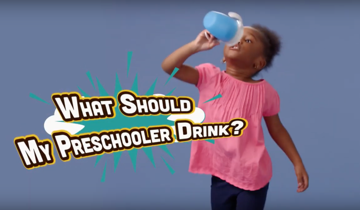From ages 4-5, your preschooler only really needs two things: Water & Milk. Water is a great go-to drink throughout the day (1.5-5 cups of water per day). Low-fat (1%) or fat-free (skim) milk is great for mealtime (up to 2.5 cups of milk per day). If your kid can’t have dairy, talk to your health care provider about unsweetened alternatives. What about juice? If you choose to serve juice, use 100% fruit juice and no more than 4-6oz per day. Cheers!
4-5 years
Drink:
Water
- Children 4 to 5 years old should drink 1.5 to 5 cups of water a day.
- The amount of water each child needs might vary from day-to-day based on how active s/he is, the weather, or the amount of fluids s/he gets from other beverages like milk or foods like soups and applesauce.
Milk
- Children 4 to 5 years old should drink plain, pasteurized fat-free (skim) or low-fat (1%) milk. The recommended amount is up to 2.5 cups a day.
Limit:
100% Fruit Juice
- Children ages 4 to 5 years old should drink no more than 4-6 ounces of 100% juice per day. Adding water to 100% fruit juice can make a little bit of juice go a long way.
- As much as possible, children should meet their daily fruit intake by eating fruit in fresh, canned, or frozen forms without added sugars, rather than by drinking juice, as this is the best option.
- If this is not possible, then a combination of whole fruit and 100% juice is okay, as long as a child does not drink more than the upper limit of 6 ounces per day.
- This is because juice, even 100% fruit juice, can contribute to dental cavities, and if kids drink more than is recommended, it can have other negative health impacts such as weight gain.
Avoid:
- Children 4 to 5 years old should not drink flavored milks (e.g., chocolate, strawberry), “transition” or “weaning” formulas (sometimes called toddler milks, growing up milks, or follow up formulas), plant-based and non-dairy milks (e.g., almond, rice, oat), caffeinated beverages (e.g., soda, coffee, tea, energy drinks), low-calorie sweetened beverages (e.g. “diet” or “light” drinks, including those sweetened with Stevia or Sucralose), or sugar-sweetened beverages (e.g., soda, fruit drinks and fruit flavored drinks, fruit-ades, sports drinks, energy drinks, sweetened waters, and sweetened coffee and tea beverages).
- Plant milks/non-dairy beverages are not recommended for exclusive consumption in place of milk. Evidence indicates that, with the exception of fortified soy milk, many plant-based/non-dairy milk alternatives lack key nutrients found in cow’s milk. Our bodies cannot absorb nutrients in these non-dairy milks as well as they can from regular milk. Non-dairy milks may be a good choice if a child is allergic to dairy, lactose intolerant, or is in a family that has made specific dietary choices such as abstaining from animal products. Be sure to consult with your health care provider to choose the right milk substitute to ensure that your child is still getting adequate amounts of the key nutrients found in milk, such as protein, calcium, and vitamin D, which are essential for healthy growth and development.
Learn more at www.healthydrinkshealthykids.org.

